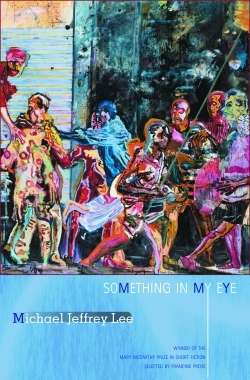Something in My Eye
- 2012 INDIES Finalist
- Finalist, Short Stories (Adult Fiction)
The characters in Michael Jeffrey Lee’s Something in My Eye come out from under all sorts hiding places—a slaughterhouse floor, a whorehouse, a couch by the edge of a river, even hell.
It’s these characters that compelled Francine Prose to select Lee’s collection for the Mary McCarthy Prize in Short Fiction: “I was drawn to [the] line up of loners and drifters, imperiled children and haunted psychos … because the invitation to inhabit their minds, to see the world through their eyes, and to watch their often unsettling stories play out in space and time enables Lee to do all sorts of extremely interesting things with consciousness and language.”
Lee also utilizes a variety of structures that, once encountered, you can’t imagine the story told any other way. “Contemporary Country Music: A Songbook” is a series of ten country songs framing a son’s return from war. The transition home is not easy: “no john all the pawn shops are closed and wal-mart wouldn’t sell you a gun with beer on your breath no not even in that uniform.” Things are not what they used to be for anyone in the family.
“Murder Ballad” is the tortured conversation between two lovers in the afterlife—one in heaven, the other in hell. “We’ll have our own place in the comforting flames, a little apartment,” promises the man in hell for pulling the trigger on them both. “And we’ll laugh together. We’ll learn how. When you ask me how my day went and I ask you how your day went we’ll both just laugh and laugh and laugh until the flesh falls from our bones and we’ll be two skeletons in love.”
The narrator of “I Shall Not Be Moved,” a little man who loves alcohol and men, does not want to leave New Orleans in light of a brewing hurricane. He has found a home: “I will not be separated from the city I love. Here I have found, if not complete acceptance of who I am, an environment in which I am able to exploit the dimensions of my body to achieve something resembling a normal life.” But an afternoon at his favorite bar with a young man writing poems on napkins changes a few things.
Lee’s language—punchy in some stories, lyrical in others—is always direct. He lives in New Orleans and is an associate fiction editor at the New Orleans Review.
Reviewed by
S. Hope Mills
Disclosure: This article is not an endorsement, but a review. The publisher of this book provided free copies of the book to have their book reviewed by a professional reviewer. No fee was paid by the publisher for this review. Foreword Reviews only recommends books that we love. Foreword Magazine, Inc. is disclosing this in accordance with the Federal Trade Commission’s 16 CFR, Part 255.

